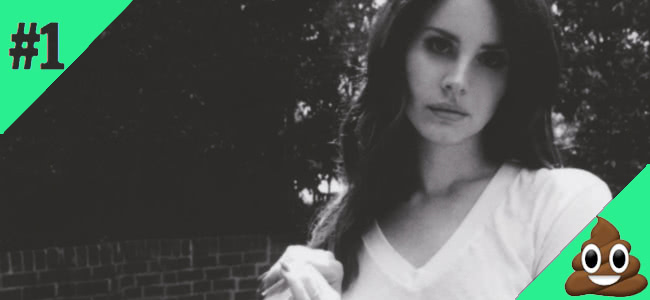In the weeks leading up to Lizzy Grant’s second release as Lana Del Rey, she’s dropped a steady stream of tracks and raised a few eyebrows over her comments in regards to outer space being more interesting than feminism.
Then again, since ‘Video Games’ mysteriously dropped online in late 2011 it feels like there’s hardly been a time when the singer hasn’t found herself in the headlines. She dominated music media clickbait since 2012 featuring in everything from the good (a surprisingly solid debut album), the bad (that ‘lost’ debut album), and the ugly (the infamous SNL performance).
It’s no surprise that given her previous attempts at fame that Grant has continued to bait us along ever since with stories of her quitting music, a lacklustre Paradise EP, numerous track leaks, and the short film Tropico.
But of course the question bigger than those collagen filled lips is whether Ultraviolence will see her worthy of the continued attention. So is it a hit or just shit? Let’s find out.
Shit
As the title track hit the airwaves in the lead up to this release there was plenty of outrage to feed the media cycle. Grant has attracted more than her fair share of criticism in the past and there’s no denying that the singer and her team shrugged it off in the same way any pop star would; by pushing the boundaries even further, that is. “He hit me and it felt like a kiss” she sings on ‘Ultraviolence’ and if that wasn’t a warning that this zone is strictly prohibited for anyone who even considers themselves as half a feminist then tracks like ‘Fucked My Way To The Top’ and ‘Pretty When You Cry’ should convince them to avoid Ultraviolence like the plague.
While Grant might sing “I’m pretty when I cry” on the former, it’s by no means her worst offence here. “I’ve got feathers in my hair, I get down to Beat poetry and my jazz collection’s rare” – as she puts it on ‘Brooklyn Baby’ – is almost a little too outrageously vapid to be taken seriously, but then again perhaps that’s the point? Lana Del Rey: the enigma, is a pop star after all and she has perfectly assumed her role by capturing our attention.
It’s not like her core fan base is likely to turn away either. Del Rey proved she has a penchant for being dramatic in regards to fame, fortune, and love in a 21st Century celebrity obsessed way on debut LP Born To Die that makes her old style Hollywood image easily transparent.
Hit
There is enough stylistic progression in this record to keep her fans interested. A greater reliance on electric guitars than strings suggests that The Black Keys’ Dan Auberbach, who assisted in the production of Ultraviolence, has successfully let his influence linger on the record, but he doesn’t quite bring her back to Earth entirely. You could argue that on Ultraviolence Grant over-caters for everyone but her hardcore fans… While there is less overblown orchestra-led grandiosity – the title track permitting – the guitar solos on ‘West Coast’, ‘Money Power Glory,’ and ‘Sad Pretty Girl’ still prove that Grant doesn’t function without dramatically blowing things skyward.
Shit
You could argue that on Ultraviolence Grant over-caters for everyone but her hardcore fans to a point that might actually turn them away. The repetitive lyrics of ‘Sad Girl’ (re: “I’m a sad girl” over and over) would have the ability to effectuate just about as much genuine emotion as if it came from a wooden doll.
On the anthemic ‘Money Power Glory’, the singer chants the title words of the song in a way that provides her audience with little substance. More worrying though is imagining a large festival audience chant the chorus back at her in a way that eerily mirrors a cultish practice.
Hit
While overdoing it lyically for her listeners might have been a miscalculation, Grant and her team have wisely chosen to stick close to the same sonic mould as her debut. It might have been tempting to take a right turn towards the club after the success of Cedric Gervais’ remix of ‘Summertime Sadness’, but the music on Ultraviolence still feels like it’s powered from the same black and white filter that matches her aesthetic.
Shit
This slight evolution in sound is refreshing enough to allow the dark guitar lines of ‘West Coast’, indie rock narrative ‘Brooklyn Baby’, and the drum thumping opener in ‘Cruel World’ to be catchy pop tracks without feeling like second-rate versions of their counterparts on Born To Die. However there’s no denying that this new LP lacks a bona-fide hit single or two to retain your interest. There’s nothing here that stands out quite like ‘Video Games’, ‘Blue Jeans’, or ‘Summertime Sadness’.
Hit
That being said her second record does feel more cohesive and focused as a whole. Songs like the hypnotic ‘Shades Of Cool’ and the grand downbeat ballads in ‘Old Money’ and ‘The Other Woman’ are your atypical album cuts that work greater contextually as a whole over time than they do on their own. They carry that same beguiling trait we first heard on ‘Video Games’ that retains her old Hollywood mystique.
Final Verdict: Shit
That is unless you’re highly devoted to the Lana Del Rey fantasy that she perpetuates. With the highly dubious lyrical assertions on love and fame that could be interpreted – or misinterpreted for that matter – in a number of troubling ways aside, Grant serves her core fan base by using a similar formula to Born To Die albeit slightly refined and updated.
However for anyone and everyone else that would classify themselves as more than just casually interested, there’s no denying that the tracks don’t have the same strength or appeal as her debut.




































